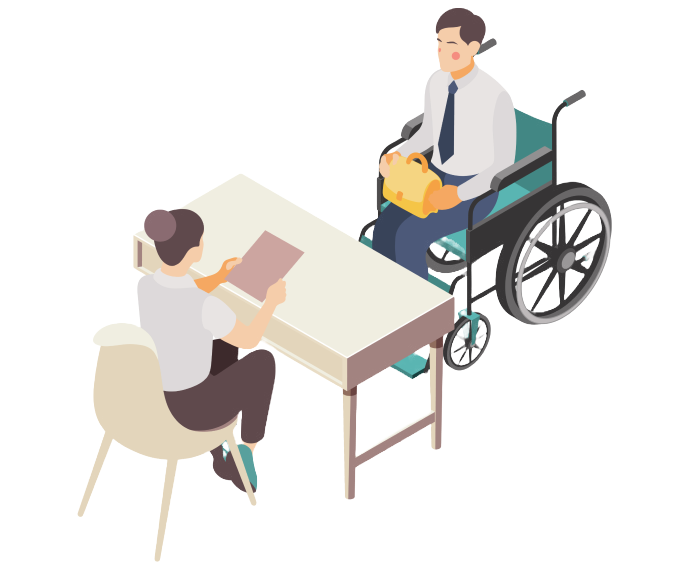Types of Disability

Disabilities Come in Many Forms
Whether caused by injury, illness, or other conditions, we’re here to help you navigate the claims process. Our team works with medical professionals to gather comprehensive evidence for your claim, ensuring the Social Security Administration understands the full extent of your condition.
Physical Disabilities
Physical disabilities can significantly impact your daily life and ability to work. These disabilities might result from accidents, injuries, or medical conditions. Examples include:
Back Injuries & Pain
Damage to the spinal cord that cause ongoing pain, and can lead to partial or complete paralysis.
Mobility Impairments
Conditions that limit your ability to move, such as severe arthritis or muscular dystrophy.
Limb Loss
Amputations resulting from accidents, illness, or congenital conditions.

Mental Disabilities
Mental disabilities can be just as debilitating as physical ones, affecting your ability to function daily and maintain employment. Examples include:

Post-Traumatic Stress Disorder (PTSD)
Severe anxiety and flashbacks triggered by traumatic events.
Depression
Persistent feelings of sadness and loss of interest that impact daily life.
Anxiety Disorders
Chronic anxiety that interferes with your ability to work and engage in normal activities.
Chronic Illnesses
Chronic illnesses are long-term conditions that require ongoing medical attention and limit your ability to perform everyday tasks. Examples include:
Long COVID-19
Persistent symptoms following a COVID-19 infection, such as fatigue and respiratory issues.
Autoimmune Conditions
Diseases where the immune system attacks the body, like lupus or rheumatoid arthritis.
Neurological Disorders:
Conditions affecting the nervous system, such as multiple sclerosis or epilepsy.

Sensory Impairments
Sensory impairments affect your ability to see, hear, or speak. Examples include:

Vision Loss
Conditions like glaucoma or macular degeneration that significantly impair sight.
Hearing Loss
Profound hearing loss or deafness.
Speech Disorders
Severe stuttering or conditions that affect verbal communication.
Cardiovascular Conditions
Cardiovascular conditions can severely restrict your ability to perform physical activities. Examples include:
Chronic Heart Failure
Persistent and progressive weakening of the heart muscle.
Ischemic Heart Disease
Reduced blood flow to the heart, often resulting in chest pain or heart attacks.
Peripheral Artery Disease
Reduced blood flow to the limbs, causing pain and mobility issues.

Neurological Disorders
Neurological disorders affect the brain, spinal cord, and nerves, leading to various physical and mental symptoms. Examples include:

Epilepsy
Recurrent seizures that impact daily functioning.
Parkinson's Disease
A progressive disorder that affects movement and coordination
Migraines
Severe and frequent headaches that can be debilitating
Increasing Your Chances of a Successful Claim
Regardless of the type of your disability, we help you gather the necessary medical records and evidence to support your claim. We ensure that all aspects of your condition are well-documented and effectively presented to the Social Security Administration, increasing your chances of a successful claim.

Contact Us for Your Disability Claim
Navigating a disability claim can be challenging, but you don’t have to do it alone. We’ll help guide you toward a successful outcome.
